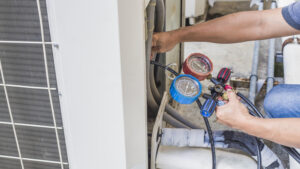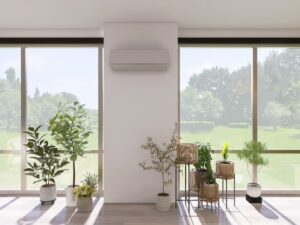How Does My Heat Pump in Lorida, FL, Work?
A heat pump is a system that heats and cools. It’s efficient and used in homes and businesses in Lorida, FL. You can find various heat pumps, including air-source, ground-source and absorption versions. Read on to learn how a heat pump works.
How Does a Heat Pump Work?
All heat pumps work based on heat transfer. Instead of using fuel to create heat, they move heat from one area to another. Thermodynamics explains how heat flows: It travels from higher temperatures to lower temperatures.
A heat pump reverses this process by removing heat from a lower-temperature area and transferring it to an area with a higher temperature. The heat sink receives the hot air into the air in your home.
A heat pump has two major parts: an indoor component to handle the air and an outdoor component. When it’s in cooling mode, it operates similarly to an air conditioner.
Both of these machines absorb heat and expel it through the outdoor part of the system. Here’s a brief rundown of the components of heat pumps:
- Reversing valve.
- Compressor.
- Expansion valve.
- Refrigerant.
In cooling mode, heat pumps extract heat from the indoor air and release it outdoors by reversing the refrigerant flow through a reversible valve. This method facilitates the transfer of heat to the outside environment. When operating in heating mode, heat pumps reverse the refrigerant flow using a reversing valve, allowing them to absorb heat from the outside air and releasing it indoors. The process remains the same, with refrigerant absorbing heat, applying pressure and cooling through the indoor unit to produce warm liquid.
Air-Source Heat Pumps
An air-source heat pump takes heat from outside the house and sends it into coils filled with refrigerant. The reversing valve plays a crucial role in enabling the air-source heat pump to function as a cooling system.
This component alters the refrigerant’s direction of flow, allowing the system to run in reverse. Instead of generating heat indoors, the system expels it.
By reversing the refrigerant flow, the pump absorbs warmth from the indoor environment and transfers it outdoors, where the heat disperses. The refrigerant then cools down and returns indoors to absorb more heat, repeating the cycle until it reaches the right temperature.
To make an air-source heat pump operate as a cooling system, the reversing valve assumes a pivotal role. By changing the direction of the refrigerant’s flow, this versatile valve enables the system to operate in reverse.
The refrigerant flow reversal process allows the pump to extract warmth from the indoor surroundings and transmit it outdoors for dissipation. Subsequently, the refrigerant cools down and cycles back inside, absorbing more heat and repeating the process.
Ground-Source Heat Pumps
Geothermal heat pumps, also known as ground-source heat pumps, have a unique operating mechanism. They extract heat from the ground or an underground water source and transfer it indoors or vice versa. The most widely used type of geothermal heat pump directly draws heat from the earth through water or refrigerant-filled buried pipes to facilitate heat transfer.
Absorption Heat Pumps
Absorption heat pumps, unlike conventional air-source heat pumps that rely on electricity, utilize natural gas, solar power, propane or geothermal-heated water as a power source. Although absorption pumps typically operate in large-scale applications, they’re now available for residential use. The fundamental distinction between a standard air-source and an absorption pump is that the latter absorbs ammonia into water instead of compressing a refrigerant.
Understanding the different types of heat pumps available and their unique features can help you make an informed decision when it’s time to install one. Whether it’s an air-source heat pump, a ground-source heat pump or an absorption heat pump, each type offers its own benefits and drawbacks. Contact us at Miller’s Central Air, Inc. to schedule your heat pump service or installation today.
Image provided by iStock
You May Also Like

Need a Commercial HVAC Repair in Stuart, FL? Don’t Delay!
When your commercial HVAC system falters during the busiest season of the year, every moment counts. The warm Florida sun beating down… Continue Reading Need a Commercial HVAC Repair in Stuart, FL? Don’t Delay!…

Winter Indoor Pollutants Common in Port St. Lucie, FL
While neighbors string lights and celebrate the season, an invisible threat lurks inside Port St. Lucie, FL, homes. Sealed windows trap stagnant… Continue Reading Winter Indoor Pollutants Common in Port St. Lucie, FL…

What’s Ductless Heating and Cooling in Jenson, FL?
November mornings in Jensen, FL, go something like this: you reach for a light sweater at dawn, only to crank up the… Continue Reading What’s Ductless Heating and Cooling in Jenson, FL?…
